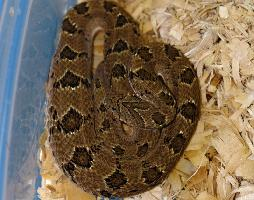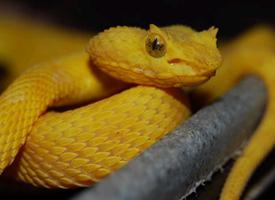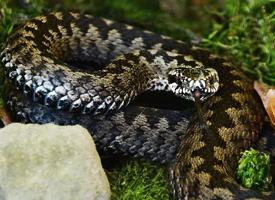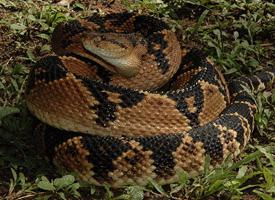
Animal description
The Rhombic Night Adder (Causus rhombeatus) is a fascinating species of venomous snake native to sub-Saharan Africa. This serpent is part of the Viperidae family, which is known for its highly effective venom delivery systems. Despite its potent venom, the Rhombic Night Adder is considered less dangerous to humans compared to other African vipers, due to its relatively mild venom and somewhat reclusive nature.Adult Rhombic Night Adders typically reach lengths of about 60 to 90 centimeters, although some specimens can grow slightly larger. Their bodies are robust and somewhat stocky, which aids them in their primarily terrestrial lifestyle, though they are also capable climbers when the need arises. The skin of these snakes is covered in keeled scales, which gives them a slightly rough texture.
One of the most distinctive features of the Rhombic Night Adder is its coloration and patterning. The background color can vary significantly across individuals, ranging from grey to various shades of brown, and even occasionally a greenish hue. Superimposed on this background are darker, often rhombic or chevron-shaped, markings that run down the length of the body. This patterning provides excellent camouflage against the forest floor and underbrush, allowing the snake to remain concealed from both predators and prey.
The head of the Rhombic Night Adder is distinct and somewhat triangular, a common trait among vipers, with a short, rounded snout. Its eyes have vertical pupils, which is an adaptation for nocturnal activity, although this species is known to be active during the day as well. The snake's venom apparatus includes relatively long, hinged fangs at the front of the mouth, which it uses to deliver venom into its prey.
In terms of behavior, the Rhombic Night Adder is primarily a terrestrial and nocturnal predator, although it can exhibit diurnal activity in cooler weather. It preys on a variety of small vertebrates, including frogs, toads, small mammals, and sometimes birds. Its venom, though not typically lethal to humans, is highly effective at subduing its natural prey.
The reproductive habits of the Rhombic Night Adder involve ovoviviparous reproduction, where the female retains the eggs inside her body until they are ready to hatch, giving birth to live young. This method of reproduction allows the snake to give birth to relatively well-developed offspring, which can fend for themselves almost immediately after birth.
Despite its venomous nature, the Rhombic Night Adder plays an important role in its ecosystem as both a predator and prey. It helps control populations of small vertebrates, while also serving as a food source for larger predators. Conservation efforts for the Rhombic Night Adder and its habitat are crucial for maintaining the balance of these ecosystems.
Overall, the Rhombic Night Adder is a remarkable example of adaptation and survival in the diverse environments of sub-Saharan Africa. Its unique appearance, behavior, and ecological role make it a species of interest not only to herpetologists but also to anyone fascinated by the rich biodiversity of the African continent.
Similar Animals
New photos of animals
Top 10 animals
- Dolphin gull (Leucophaeus scoresbii)
- Diana monkey (Cercopithecus diana)
- Moustached guenon (Cercopithecus cephus)
- Galápagos tortoise (Geochelone nigra complex)
- Stone loach (Barbatula barbatula)
- Japanese macaque (Macaca fuscata)
- Russian tortoise (Testudo horsfieldii)
- Greek tortoise (Testudo graeca)
- Common flying dragon (Draco volans)
- Vendace (Coregonus albula)


